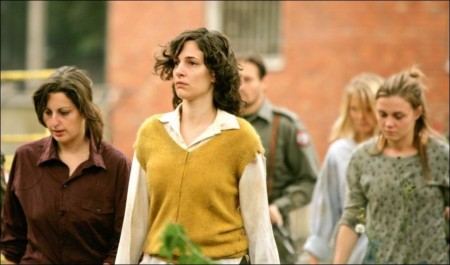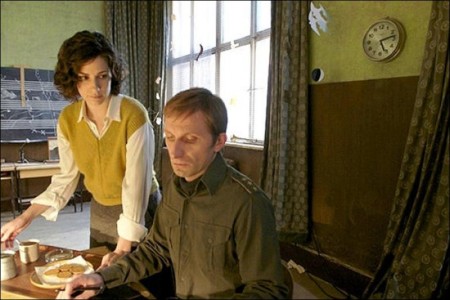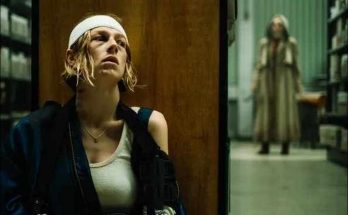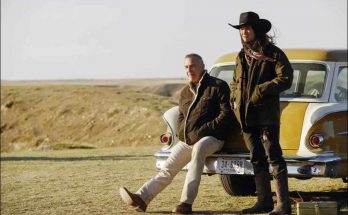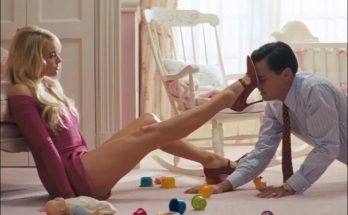Every cast member of In the Land of Blood and Honey was in some way directly affected by the events of the war. Each brought their own stories and experiences to the project and enriched their characters and the film with their own histories.
Zana Marjanoviæ was fortunate enough to be able to escape to Slovenia during the war. “I was born in Sarajevo and was only eight years old during the war. My father chose to stay in Sarajevo. The war came as a huge surprise, and no one thought the war would last as long as it did. It’s one of the reasons why my mom took us to Slovenia. Many Bosnian Muslims emigrated, but my mother believed the war would end the next day, every day. So we waited in the closest country for the war to end, so we could go back home.”
In 2001, Marjanoviæ moved back to Sarajevo where she currently lives. The notion of Ajla being an artist was what Marjanoviæ most personally connected with. Being an artist allows Ajla to be expressive, to share the way that she sees the world, to create. It allows her to be open to new experiences and new ideas. “An artist feels and perceives things in very specific ways,” says Marjanoviæ, “and leaves his or her expression for others to see.” I like this sense of character for Ajla. Artists are also often very strong yet delicate persons. And the same could be said of Ajla.”
Goran Kostiæ suggests that it is Ajla who symbolizes the future, whereas Danijel is trapped in the past. “She is everything he is not,” Kostiæ says. “Ajla is the creative one; she is the one who sees the world. Danijel is always holding back, and she’s always pushing forward. She has a courage and an energy he is attracted to.”
Jolie sees Ajla in a precarious and almost impossible situation. “There’s a point where Danijel is safety and security. And there’s a point where she has to decide if he’s redeemable, or simply her enemy. She is put in a very different situation, and how she tries to gain the upper hand becomes the chess game of the film.”
Kostiæ, a Bosnian Serb, had a direct connection to the war, and to the character of Danijel. “Every single Kostiæ back to the beginning of time was a military person. I’m the first to break this tradition. If you weren’t a general by the age of 45 in my family, you were nothing. I had this really strong feeling growing up about who I was supposed to be. I was even accepted to the military academy, but I turned it down.”
“I was born and raised in Sarajevo. I left for London when I was 20, a year before the war started. At the time, communism was falling, and economically, Yugoslavia was quite strong.
There was a healthy middle class there. So after communism, there was an exciting liberal sense of freedom in the air. While I was in London, the war began. That entire feeling vanished overnight. My girlfriend at the time—she’s my wife now—was with me. We both realized we couldn’t go home because there was no home to go to.’
Being separated from his family made his situation all the more conflicting as the war dragged on. “It was awful. For the first two years, I felt this strange void in myself. I was working as a waiter at the time, but it was always very mechanical. My mind was somewhere else. There was a point where I knew exactly when each British station would hold their news broadcasts. I had to check the news 24 hours a day. I would jump into empty hotel rooms and watch the news to hear what was happening in Bosnia.
Thankfully, my family made it out without anyone being killed or any of our possessions destroyed. I remember talking to my mother on the phone. I can hear the bombs in the distance. All I can say is, ‘Mom, take care of yourself.’ This was the same weekend as a London bombing. And my mom actually tells me, ‘Son, take care of yourself.’ I didn’t know whether to cry or smile! It was the first time where I had to ask, ‘What should I do? Who am I as a man, as the son of a Serbian officer? Should I fight? Who should I fight for?’ I could never come up with an answer I truly believed in. Eventually, I realized that the best thing was to stay away. There was no good fight.”
He may not have fought, but Kostiæ strongly relates his own conflicts with Danijel’s. “I never participated in the war, but Danijel is also not a happy participant,” he says. “He’s isn’t strong enough to not fight. He’s not in charge of his fate. He’s a prisoner to himself and his circumstances.” Jolie notes how much Danijel is controlled by the forces around him. “By nature of his family and the war, he was put in a position that he isn’t strong enough to refuse or escape, and he doesn’t quite know how to handle it. He knows there’s something wrong. As he says, he recognizes people. He has trouble seeing an enemy in somebody he went to school with. He questions the war, but is never able to follow through with the questioning.”
“Danijel never became a true man, a free man,” Kostiæ says. “If we all had the strength to not participate, maybe the war would never have occurred. He allows himself to be pushed and shoved by history, by tradition, by his father. He doesn’t bother to protect himself from these bad dark forces coming over him. He may not pull the trigger initially, but he is just as guilty as those who do.”
Danijel’s inability to behave with any kind of will leaks into his own wishful thinking about his relationship with Ajla. “Danijel is pretending that they have some kind of normal life together,” Kostiæ says, “but it’s crumbling as time passes. It follows the way humanity deteriorates in Bosnia at that time. It begins pure and about love, and then starts twisting and turning and getting darker. Danijel starts out feeling protected with Ajla from the world outside. She is like a mother to him, but eventually it’s not about love anymore.” Marjanoviæ recognizes the conflict and strain that the relationship has on Ajla’s choices.
“She’s constantly in conflict. She’s not in love with the enemy; she’s in love, and later, that person becomes her enemy. There’s never a single moment when she ‘turns,’ but it slowly evolves throughout the film. Ajla always has a sense of justice throughout, even if her decisions are very emotionally difficult. There’s never any hate or vengeful feelings, but she knows that her actions are right. It’s about sacrificing something you love for the greater good.”
The character of Lejla serves as an emotional anchor for Ajla’s own decisions. Lejla is the sister who is trapped in Sarajevo, fighting against the Serb army, and mourning the death of her child. The woman who plays Lejla, Vanesa Glodjo can relate to Lejla’s situation. She too lived through the siege of Sarajevo, as a teenager. “I lived on the front line, and had to walk to my school through the snipers every day,” she says. “It was an hour-and-a-half in each direction, every day. We were blocked in for four years. We couldn’t leave the city. Luckily we had a small garden, so we could eat different things during the war! I wanted to be an actress before the war started, but the war blew up those plans for a while.”
Glodjo may have been front and center for the brutality of the siege, but it didn’t help her understand what was going on around her. “It’s a completely different picture seeing the war from the inside than outside. Actually, we knew less than people outside. We just experienced grenades and shelling. News was limited to prevent panic among people. In the beginning, we all thought it would last 15 days or something like that. Soon after, we saw that you could really die. When it started, it felt like you were in a war movie. But when we began to see how serious it was, we just felt fear.”
Glodjo knew a neighbor whose baby was murdered, and her emotional response was greatly informative for Glodjo when she played Lejla. “She didn’t cry for one month. She had no ability to react. But then, she would cry so loudly every night. She cried for one year after that.” Glodjo herself was also wounded during the war.
Marjanoviæ notes the shifting roles that occur within Ajla and Lejla’s relationship. “Ajla and Lejla take care of each other. Ajla babysits the child so that her sister can take a shower. I’ve witnessed from my own family life that young mothers don’t even have the time to do things like that! Ajla, being a little sister, sees her older sister almost as a mother. But then she grows up and ends up taking care of her older sister toward the end of the film.”
Rade Šerbedžija plays Nebojsa, the Serb general whose zeal for war is born of his own warped sense of history, an attitude that he uses to control his son, Danijel. Šerbedžija is part Serbian, but was born and raised in Croatia, which experienced its own war in 1991. “I worked everywhere in Yugoslavia,” he says. “I was creatively very happy. Life was good. Then the tensions started and I took a strong stand against nationalism and war. I went to peace meetings, talked, sang, and eventually became the enemy of all nationalist political officials.
“A big part of my family was slaughtered by Croatian Nazis during World War II. My parents never burdened me with that; on the contrary, I was raised to love. I knew some characters similar to Nebojsa. I was deeply disturbed when I saw what position they had taken in the war and where they were heading. Some of them saw a war as a chance to change their life and have a fresh start. Some were just blinded by nationalism.”
Šerbedžija was in Bosnia when the war started, and it destroyed his reputation in the region. “I stayed for two weeks in Sarajevo after the fighting started, and then I had to go back to Belgrade where my wife was about to give birth. That was how our exile started. I was a ‘traitor and enemy’ in both Croatia and Serbia for my public anti-war views. I didn’t want to choose the side of any nation. I was on the side of humanity and peace, but that was very unpopular at the time.”
For Šerbedžija, Nebojsa is as much a slave to bigger forces as Danijel is. “His perspective is heavily burdened by the trauma from his childhood and probably by being an unhappy person as a whole” he says. “He is obsessed by the mythology and the past as unfortunately many people became. He goes back to what some Muslims did to his family in the Second World War. We see what an unhappy person Nebojsa is. No matter how big his wounds are, it is not justification for taking a revenge on innocent people 60 years later.”
Read full production notes for In the Land of Blood and Honey >>
Visits: 99
